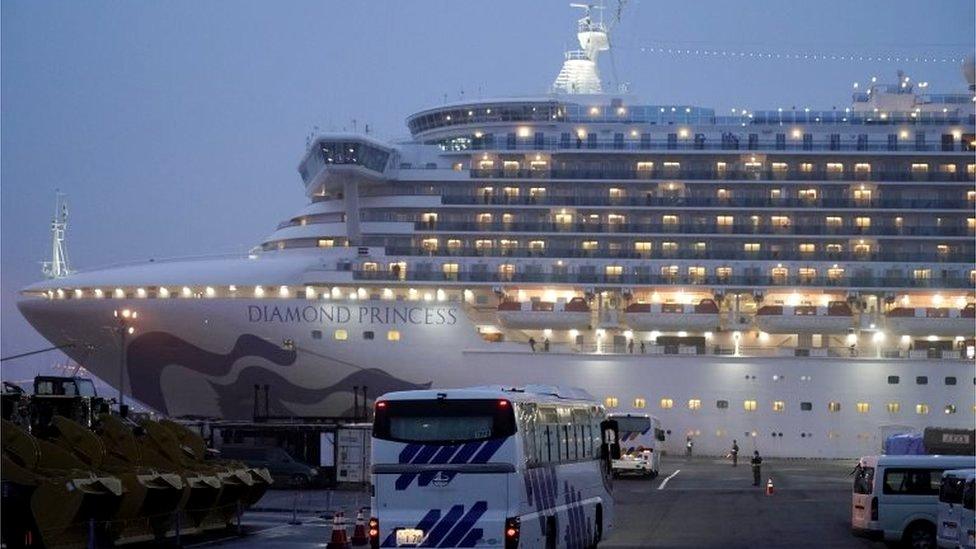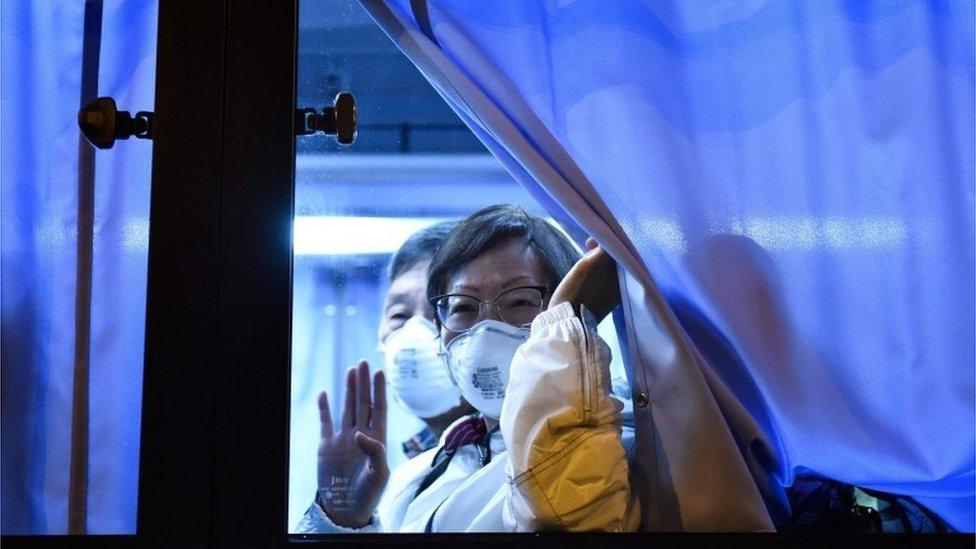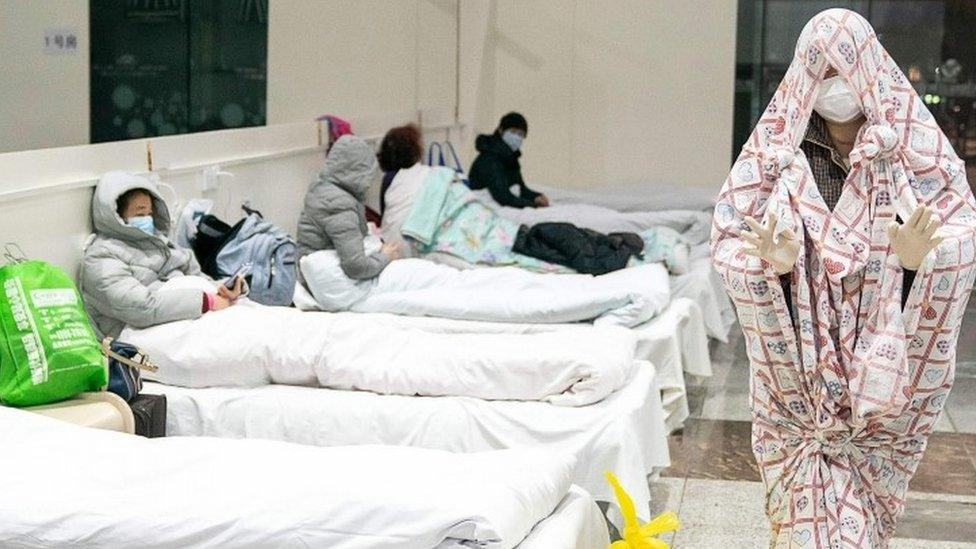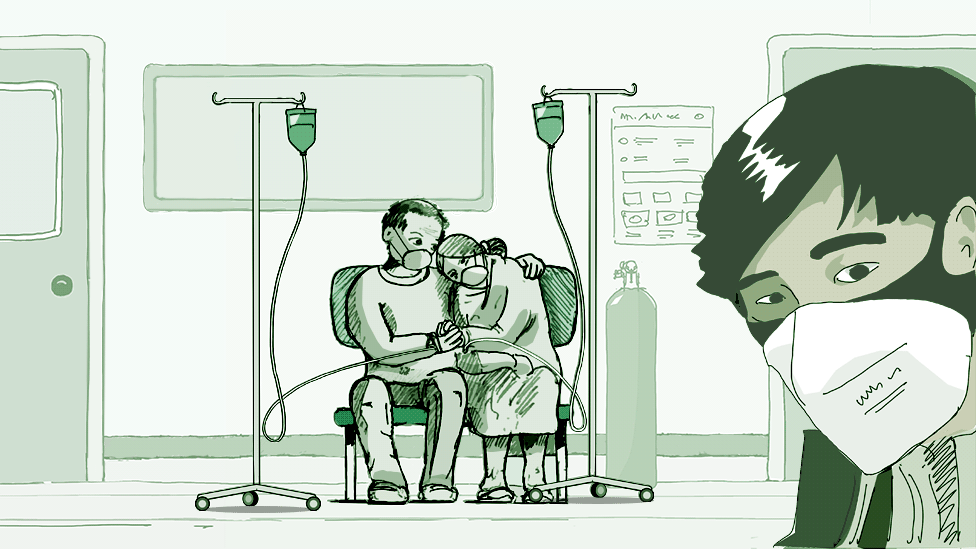Coronavirus: Passengers leave Diamond Princess amid criticism of Japan
- Published
Coronavirus: Quarantined passengers released from Japan ship
Hundreds of passengers who tested negative for the new coronavirus have begun leaving a quarantined cruise ship in Japan amid heavy criticism over the country's handling of the outbreak.
One Japanese health expert who visited the Diamond Princess at the port in Yokohama said the situation on board was "completely chaotic".
US officials said moves to contain the virus "may not have been sufficient".
Passengers have described the difficult quarantine situation on the vessel.
At least 621 passengers and crew on the Diamond Princess have so far been infected by the Covid-19 virus - the biggest cluster outside mainland China.
The ship was carrying 3,700 people in total.
Several nations are evacuating their citizens from the ship as the number of confirmed cases continues to rise.

Some of those who disembarked on Wednesday were collected by coach
Hundreds of American passengers were removed and placed in quarantine on Sunday. Britons on the vessel have been told by the UK Foreign Office to stay onboard but register for an evacuation flight expected later this week.
A British couple on the ship - who had been giving regular updates to journalists via social media - confirmed on Wednesday they had tested positive for the virus.
UK coronavirus cruise couple: "I just want someone to take care of them"
The US, Canada, Australia and the UK will place all those released from the ship in another 14 days' quarantine when they return home.
What are the fears over the passengers?
Several experts have questioned the effectiveness of the quarantine measures on the Diamond Princess.
Kentaro Iwata, professor at the infectious diseases division of Japan's Kobe University, described the situation on board as "completely inadequate in terms of infection control".
After visiting the ship, Prof Iwata posted a video to YouTube stating that the quarantine measures he witnessed failed to separate the infected from the healthy, external.
He reported:
Passengers and crew members moving freely between the green zone, which is supposedly infection-free, and the virus-hit red zone
People eating together and sharing living quarters
A failure to wear protective clothing, including among medical staff
No professional infection control specialist on board
Coronavirus expert tells the BBC: 'I was so scared on board Diamond Princess'
The expert said he was more afraid of catching the virus on board than he had been working in the field in Africa during the Ebola epidemic and in China during the Sars (severe acute respiratory syndrome) outbreak.

More on the coronavirus outbreak

US health officials also criticised the steps, external taken by Japanese officials.
"[The quarantine measures] may not have been sufficient to prevent transmission among individuals on the ship," the US Centres for Disease Control and Prevention (CDC) warned.
"The rate of new infections on board, especially among those without symptoms, represents an ongoing risk," it said in a statement, adding that travel restrictions had been imposed on "all passengers and crew" preventing them from entering the US.
Japanese officials have defended their approach, saying that the majority of infections likely occurred before the quarantine period.
What is happening to those disembarking?
About 500 people who tested negative and who are not showing any symptoms were expected to disembark the Diamond Princess on Wednesday, with more leaving in coming days.
The released passengers made their way onto waiting coaches or into taxis, reports the BBC's Laura Bicker, who is at the port in Yokohama.
They will be allowed to return to life as normal, but will be contacted over a period of several days to check on their health, Japan's health ministry said.

About 3,700 people were quarantined on board the Diamond Princess
Those who tested negative but had shared cabins with infected people will have to remain on board for additional quarantine.
The passengers come from more than 50 countries, raising concerns the ship could become the source of a fresh wave of global infections, our correspondent says.
South Korea, which reported 15 new cases of the coronavirus on Wednesday, said it would ban entry to any foreign passengers of the Diamond Princess.
How did the ship end up in quarantine?
The cruise ship was put in quarantine in Yokohama in early February after a man who disembarked in Hong Kong was found to have the virus.
Passengers were initially isolated in their cabins and later allowed to sporadically go out on deck.
Despite the quarantine measures, day by day the number of people to test positive for the Covid-19 virus grew rapidly.
Americans are taken from the docked ship to Haneda airport in Tokyo
Covid-19 has now claimed more than 2,100 lives in China, according to Chinese data released on Thursday.
There have been more than 75,000 confirmed infections recorded in mainland China and more than 1,000 cases in other countries.
South Korea reported 31 new cases, bringing the country's total to 82.
Iran says two people infected with the virus have died in the city of Qom - the first reported deaths in the Middle East.
On Wednesday, Hong Kong said a 70-year-old man with underlying illnesses became the territory's second fatality. France, Japan, the Philippines and Taiwan have each had one death attributed to the virus.
China on Monday released a detailed study of more than 44,000 confirmed cases indicating that the overwhelming number of deaths occur among the sick and elderly.
- Published19 February 2020

- Published17 February 2020

- Published14 February 2020

- Published14 February 2020

- Published17 February 2020
